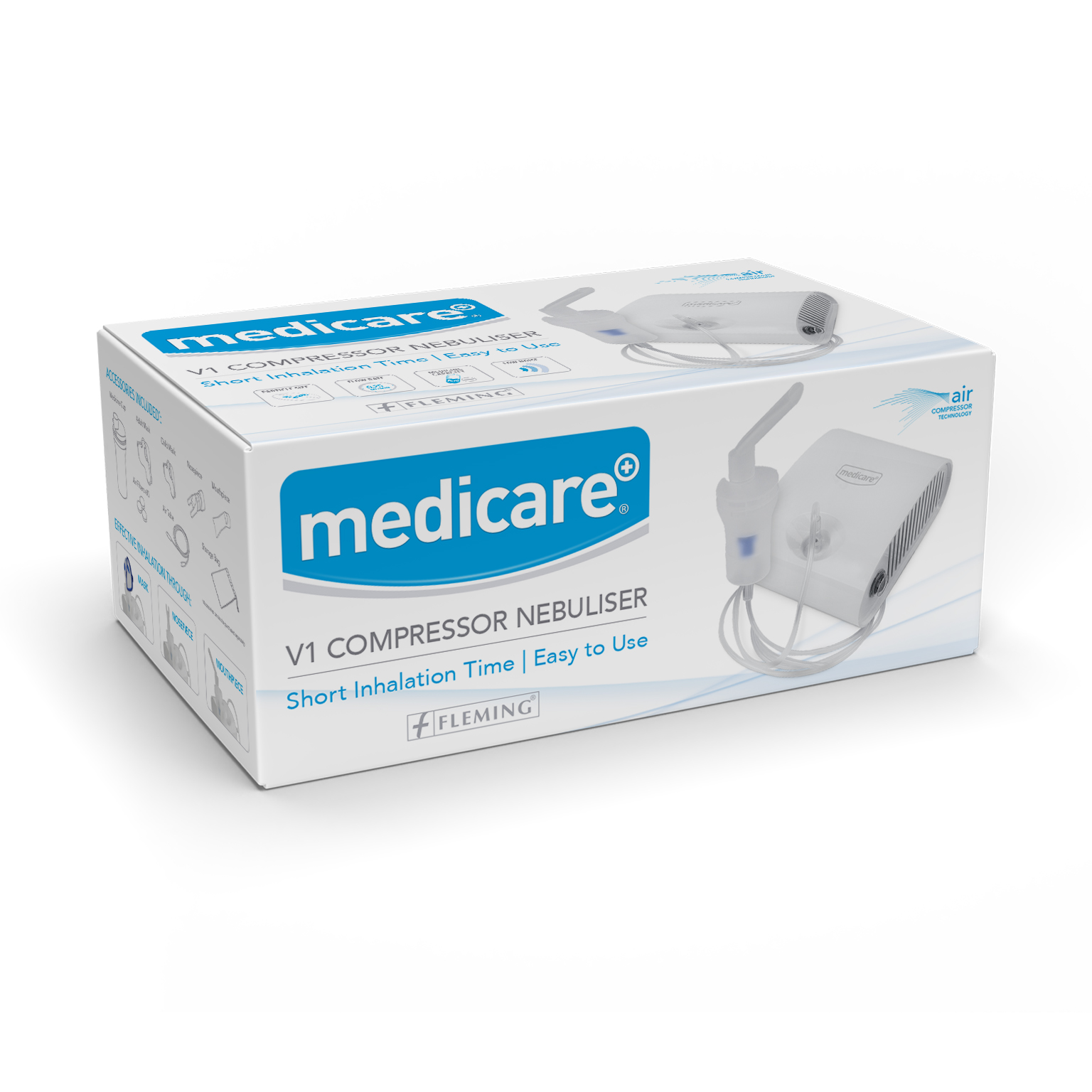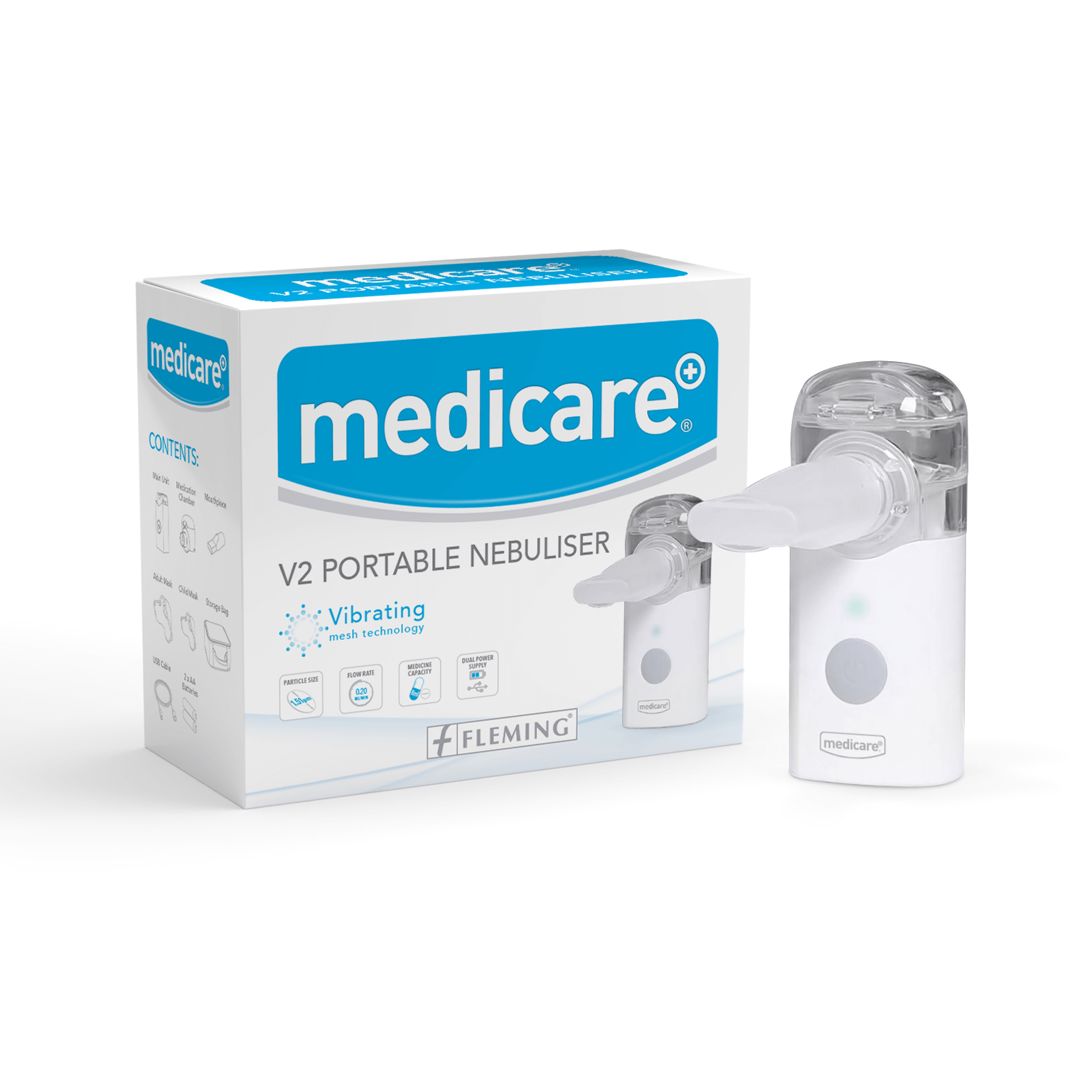Headlines
- Keeping Customers Covered: How Pharmacies can address the Summer Burn Surge - A clinical and practical guide for pharmacy teams
- Fleming Medical Achieves ISO 13485 Certification – Reinforcing Our Commitment to Patient Safety and Quality
- Gentle Daily Ear Care with Medicare Ear Spray
- Breathe Easy with Medicare Nasal Spray
- Fleming Medical Renews Support for Irish Heart Foundation’s “Before Damage is Done” Campaign with over €25K Donation
Nebulisers & COPD: Frequently Asked Questions
20 November 2020
As November is COPD Awareness Month, we are covering the topic of nebulisers and the common questions that users may have. Always consult your doctor if you think you need a nebuliser for your respiratory needs.
What is a nebuliser?
A nebuliser is a device that converts certain medications or sterile saline solutions from liquid form to a mist so that a person may inhale it into their lungs. The purpose of a nebuliser is similar to that of an asthma inhaler and is used as an alternative to a m etered dosage from an inhaler
Why would I use a nebuliser?
Nebulised therapy is often used to give high doses of reliever medication in emergency situations and can also be used as a more comfortable and effective delivery system of medication on a regular basis. A nebuliser will turn your medicine into a mist, making it easy and pleasant to breathe the medicine directly into your lungs. Taking slow, deep breaths for 10 to 15 mins allows the medicine to be fully absorbed into the lungs. Nebulisers are often used by people with respiratory conditions such as COPD, Asthma and Cystic Fibrosis. They are also used by those who find it difficult to use inhalers, like children, infants, the elderly or those who are very ill.
How does it benefit people with COPD?
One of the key benefits of inhalation is the fact that the medication is delivered directly into the respiratory tract, allowing for a high drug concentration in the target area. Neb ulising medication can even have a greater clinical effect compared to similar or larger doses delivered orally (tablets) or by subcutaneous injection. Studies have also shown that this can lead to better treatment results than using inhalers alone.
respiratory tract, allowing for a high drug concentration in the target area. Neb ulising medication can even have a greater clinical effect compared to similar or larger doses delivered orally (tablets) or by subcutaneous injection. Studies have also shown that this can lead to better treatment results than using inhalers alone.
I’ve been told by my doctor that I need a nebuliser, what nebuliser should I get?
There are 2 different types of Medicare Nebulisers; the Compressor and the Portable.
The Medicare V1 Compressor Nebuliser is robust and ideal for frequent use by adults and children. This highly effective nebuliser combine s a short inhalation time with intelligent medi cation delivery thanks to its powerful compressor. It generates a steam of compressed air which breaks up liquid medication and converts it into a mist so it can be easily and more e ffectively inhaled by the patient through the mask, nosepiece or mouthpiece. The Medicare V1 Compressor Nebuliser is ideal for home and frequent use.
The Medicare Ultrasonic Portable Nebuliser with Mesh Technology uses state of the art electrospray technology that sprays liquid in an aerosol form directly to the patient for inhalation. This technologyallows for better nebulisation and comes in a compact portable size that’s designed to fit comfortably in the palm of your hand but is still powerful enough to deliver medication quickly and efficiently. It is small , discreet and is purposefully designed for use on the go. It can be used in any direction also, so it’s perfect for children who may not want to sit still or prefer to lie down.
What should I look out for when purchasing a nebuliser?
The first important factor you should consider is that the nebuliser you are buying is from a legitimate source. Your local pharmac y is a great place to buy diagnostic equipment as you can ask qualified professionals for advice and get your medicine and equipment all in one place.
A nebuliser is a device that converts certain medications or sterile saline solutions from liquid form to a mist so that a person may inhale it into their lungs. The purpose of a nebuliser is similar to that of an asthma inhaler and is used as an alternative to a m etered dosage from an inhaler
Why would I use a nebuliser?
Nebulised therapy is often used to give high doses of reliever medication in emergency situations and can also be used as a more comfortable and effective delivery system of medication on a regular basis. A nebuliser will turn your medicine into a mist, making it easy and pleasant to breathe the medicine directly into your lungs. Taking slow, deep breaths for 10 to 15 mins allows the medicine to be fully absorbed into the lungs. Nebulisers are often used by people with respiratory conditions such as COPD, Asthma and Cystic Fibrosis. They are also used by those who find it difficult to use inhalers, like children, infants, the elderly or those who are very ill.
How does it benefit people with COPD?
One of the key benefits of inhalation is the fact that the medication is delivered directly into the
 respiratory tract, allowing for a high drug concentration in the target area. Neb ulising medication can even have a greater clinical effect compared to similar or larger doses delivered orally (tablets) or by subcutaneous injection. Studies have also shown that this can lead to better treatment results than using inhalers alone.
respiratory tract, allowing for a high drug concentration in the target area. Neb ulising medication can even have a greater clinical effect compared to similar or larger doses delivered orally (tablets) or by subcutaneous injection. Studies have also shown that this can lead to better treatment results than using inhalers alone. I’ve been told by my doctor that I need a nebuliser, what nebuliser should I get?
There are 2 different types of Medicare Nebulisers; the Compressor and the Portable.
The Medicare V1 Compressor Nebuliser is robust and ideal for frequent use by adults and children. This highly effective nebuliser combine s a short inhalation time with intelligent medi cation delivery thanks to its powerful compressor. It generates a steam of compressed air which breaks up liquid medication and converts it into a mist so it can be easily and more e ffectively inhaled by the patient through the mask, nosepiece or mouthpiece. The Medicare V1 Compressor Nebuliser is ideal for home and frequent use.
The Medicare Ultrasonic Portable Nebuliser with Mesh Technology uses state of the art electrospray technology that sprays liquid in an aerosol form directly to the patient for inhalation. This technologyallows for better nebulisation and comes in a compact portable size that’s designed to fit comfortably in the palm of your hand but is still powerful enough to deliver medication quickly and efficiently. It is small , discreet and is purposefully designed for use on the go. It can be used in any direction also, so it’s perfect for children who may not want to sit still or prefer to lie down.
What should I look out for when purchasing a nebuliser?
The first important factor you should consider is that the nebuliser you are buying is from a legitimate source. Your local pharmac y is a great place to buy diagnostic equipment as you can ask qualified professionals for advice and get your medicine and equipment all in one place.
- Particle Size: This determines how effectively the nebuliser turns the medication into mist and how deeply it penetrates the lungs’ airways to relieve symptoms. A nebuliser that has a small particle size means that the mist is finer and more effective.
- Nebulisation/Flow Rate: This represents how long it takes for the medicine to be fully consumed by the patient. Choosing a nebuliser with a high nebulisation rate means that you won’t spend too much time sitting down using a nebuliser every day .
- Medicine Capacity: This shows how much medicine the nebuliser can hold at one time. Usually, all nebulisers have a universal medicine capacity.

 Fleming Medical UK
Fleming Medical UK


